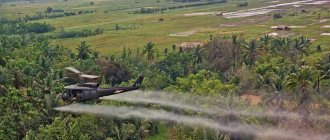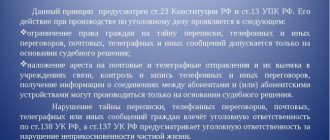Article 260 of the Criminal Code of the Russian Federation Illegal logging of forest plantations among environmental crimes is the most common in practice. The composition provides for felling or damage to the point of stopping the growth of forest plantations or trees, shrubs, and vines not classified as forest plantations, committed illegally, that is, in the absence of a special permit (for example, a felling ticket, etc.). The Code of Administrative Offenses in Article 8.28 provides for liability for a similar act, in contrast to Art. 260 of the Criminal Code of the Russian Federation is that criminal liability occurs if there is a significant amount.
Thus, for liability to arise under Art. 260 of the Criminal Code of the Russian Federation requires such signs as:
- the presence of the act itself (cutting or damage until growth stops);
- illegality of the said act (lack of permission, felling certificate);
- significant size.
The presence of these three signs form a simple composition of Art. 260 of the Criminal Code of the Russian Federation, which provides for punishment of up to two years in prison.
Part 2 Art. 260 of the Criminal Code of the Russian Federation provides for a more severe sanction - up to four years in prison, and is characterized by additional qualifying characteristics - a group of persons using their official position on a large scale. Part 3 of this article is formed by such qualifying features as especially large size, a group of persons by prior conspiracy, an organized group, and belongs to the category of serious crimes since the maximum sanction for such a crime is up to 7 years of imprisonment.
The question arises of what is considered significant, large and especially large in size under this article.
According to the notes to Art. 260 of the Criminal Code of the Russian Federation, a significant amount in this article recognizes damage caused to forest plantations or trees, shrubs and vines not classified as forest plantations, calculated according to the rates and methods approved by the Government of the Russian Federation, exceeding five thousand rubles, large-scale - fifty thousand rubles, especially large-scale size - one hundred fifty thousand rubles. CRIMINAL LAWYER call now: ☎ 8 (495) 532-75-40
Composition of the crime under the article
Items of illegal logging include trees, shrubs, and vines growing in forests. They cannot be fruit or berry bushes and trees that grow on agricultural lands, with the exception of those located on dacha and garden plots, unless otherwise provided by current regulations.
That is why cutting dead wood is not illegal, since dead wood itself is not defined as the subject of a crime under Art. 260 of the Criminal Code of the Russian Federation.
The objective side of the crime is expressed in illegal logging or damage to forest plantations and trees.
Reference. Within the meaning of the commented article, felling means not only the process of sawing and felling, but also any other method of separating a tree or shrub from the ground (uprooting, pulling out, etc.).
If any enterprise intends to use forests on forest fund lands, then for this it must be registered as a legal entity and have the appropriate documents.
Legal entities and individuals, as well as individual entrepreneurs, have the right to cut down trees or shrubs if they have forest lease agreements or forest purchase and sale agreements. In particular, the latter will be needed by those citizens who harvest wood for heating, construction or other needs.
The meaning of the comments to Art. 260 of the Criminal Code of the Russian Federation is that the subjective side of the offense is characterized by direct intent. This means that the citizen carrying out the logging is fully aware of the social danger of his act and understands that it will result in serious harm, and also wants the latter to occur.
The offense is considered completed when the tree or shrub has been completely separated from the ground or when it has been damaged to the point of stopping growth, provided that the result of the act was the infliction of serious harm.
The acts listed in Part 1 and Part 2 of Art. 260 of the Criminal Code of the Russian Federation, belong to the category of crimes of minor gravity, and those specified in Part 3 - to the category of moderate gravity. Art. 260 part 3 of the Criminal Code of the Russian Federation is subject to amnesty.
Objects and subjects of crime
The main object of the crime is public relations in the field of protection and rational use of forest plantations. They are regulated by the following legislation:
- Law on Environmental Protection;
- Forest Code of the Russian Federation (the main source that determines relations in the field of forest management in Russia);
- other legal acts of the Government of the Russian Federation, constituent entities of the Russian Federation and local governments, etc.
The subject of the act is a mentally healthy person who was 16 years old at the time of its commission. It could also be an official who gave orders for illegal deforestation.
Grounds for assigning liability
The most important reason is the infliction of significant damage as a result of the offense. To calculate it, the rates approved by the Decree of the Government of the Russian Federation No. 273 of 05/08/2007 are used, as well as the methodology given in the same document.
The essence of this technique is to assess economic and environmental damage. This takes into account how much forest was cut down, how it was done and under what circumstances.
Another mandatory basis is the establishment of a cause-and-effect relationship between two events: illegal deforestation and the occurrence of the damage itself.
Use of official position
It assumes that the subject used the powers (his status) granted to him in connection with his professional activities to facilitate the commission of the act.
If signs of abuse of power are detected, including by a person holding managerial positions in a commercial or other organization, during illegal cutting down/damage of plantings, they are not additionally qualified under Article 201 or 285. This composition is fully covered by paragraph “c” of Part 2 of Art. 260 of the Criminal Code of the Russian Federation.
It is necessary, however, to take into account that persons such as a forest foreman, a forester, etc. may be held accountable under Part 2 if they have committed a crime in the area within the boundaries of which their powers apply.
Qualification criteria
If we talk about the signs of the offense specified in Part 1 of Art. 260 of the Criminal Code of the Russian Federation, they are as follows:
- the occurrence of significant damage;
- the illegality of the acts listed in this part.
The crime in Part 2 of Art. has other signs. 260 of the Criminal Code of the Russian Federation:
- commission of an act by a group of persons;
- the person’s use of his or her official position for this purpose (these may be officials of government agencies and heads of economic entities);
- causing major damage.
Accordingly, the qualifying signs of a crime under Part 3 of Art. 260 of the Criminal Code of the Russian Federation is:
- causing particularly large damage;
- by a group of people according to a pre-prepared plan.
Normative base
Art. 260 of the Criminal Code is considered blanket, that is, referring to other legal acts regulating environmental safety. Among them are the Forest Code, as well as Regulations on:
- Protection, use, reproduction, conservation of forest resources that were previously in the possession of agricultural organizations.
- Exercising state control over the condition, protection, use, protection of plantings and their reproduction.
- Sales of standing timber within the framework of trades/auctions in the Russian Federation in agreement with the Scientific and Technical Council of the Federal Forestry Service (Federal Forestry Service).
Responsibility measures
Sentences under Art. 260 of the Criminal Code of the Russian Federation is issued in accordance with what part of the commented article the crime was classified under. If according to the first, then the following punishments are chosen:
- fine up to 500,000 rubles. or a citizen’s salary for 3 years;
- compulsory work for 480 hours;
- correctional labor for 2 years;
- forced labor for 2 years with payment of a fine from 100 to 200 thousand rubles. or salary for 1-1.5 years (the latter sanction is determined by the judge at his own discretion);
- imprisonment for the same period using the above optional sanction.
If an offense is determined under Part 2 of Art. 260 of the Criminal Code of the Russian Federation the following penalties are assigned to the criminal:
- payment of a fine in the amount of 500,000 to 1 million rubles. or salary for 3-4 years;
- forced labor for 4 years with payment of a fine in the amount of 150 to 300 thousand rubles. or salary for 1.5-2 years with a ban on engaging in certain types of activities in the field of logging for 3 years (sanctions are optional);
- imprisonment in a colony for a period of up to 4 years with the application of one of the two or both of the above sanctions.
When qualifying an act under Part 3 of Art. 260 of the Criminal Code of the Russian Federation, the court sentences offenders to the following types of punishment:
- payment of a fine in the amount of 1 to 3 million rubles. or salary for 4-5 years;
- forced labor for 5 years with payment of a fine in the amount of 300 to 500 thousand rubles. or salary for 2-3 years with a ban on the right to hold positions in the field of logging (the last two measures are chosen at the discretion of the judge);
- imprisonment in a colony for a period of up to 7 years with the application of one of the two or both of the above sanctions.
Article 260. Illegal felling of forest plantations
Article 260. Illegal felling of forest plantations
[Criminal Code] [Special Part] [Section IX] [Chapter 26]
1. Illegal logging, as well as damage to the point of stopping the growth of forest plantations or trees, shrubs, and vines not classified as forest plantations, if these acts are committed on a significant scale, —
shall be punishable by a fine in the amount of up to five hundred thousand rubles, or in the amount of the wages or other income of the convicted person for a period of up to three years, or by compulsory labor for a term of up to four hundred and eighty hours, or by corrective labor for a term of up to two years, or by forced labor for a term of up to two years. with a fine in the amount of one hundred thousand to two hundred thousand rubles or in the amount of wages or other income of the convicted person for a period of one year to eighteen months or without it, or imprisonment for a term of up to two years with a fine in the amount of one hundred thousand to two hundred thousand rubles or in the amount of wages or other income of the convicted person for a period from one year to eighteen months or without it.
2. Illegal logging, as well as damage to the point of stopping the growth of forest plantations or trees, shrubs, and vines not classified as forest plantations, if these acts are committed:
a) a group of persons;
b) has become invalid;
c) by a person using his official position;
d) on a large scale, -
shall be punishable by a fine in the amount of five hundred thousand to one million five hundred thousand rubles, or in the amount of wages or other income of the convicted person for a period of three to four years, or by forced labor for a term of up to four years with a fine in the amount of one hundred fifty thousand to three hundred thousand rubles. or in the amount of wages or other income of the convicted person for a period of eighteen months to two years or without it and with or without deprivation of the right to hold certain positions or engage in certain activities for a term of up to three years, or with imprisonment for a term of up to four years with a fine in the amount of one hundred fifty thousand to three hundred thousand rubles or in the amount of wages or other income of the convicted person for a period of eighteen months to two years or without it and with or without deprivation of the right to hold certain positions or engage in certain activities for a period of up to three years.
3. Acts provided for in parts one or two of this article, committed on an especially large scale, by a group of persons by prior conspiracy or by an organized group, -
shall be punishable by a fine in the amount of one million to three million rubles, or in the amount of wages or other income of the convicted person for a period of four to five years, or by forced labor for a term of up to five years with a fine in the amount of three hundred thousand to five hundred thousand rubles, or in the amount of wages or other income of the convicted person for a period of two to three years or without it and with deprivation of the right to hold certain positions or engage in certain activities for a period of up to three years or without it, or imprisonment for a term of up to seven years with a fine of three hundred thousand to five hundred thousand rubles or in the amount of wages or other income of the convicted person for a period of two to three years or without it and with or without deprivation of the right to hold certain positions or engage in certain activities for a period of up to three years.
Note. In this article, significant damage is recognized as damage caused to forest plantations or trees, shrubs and vines not classified as forest plantations, calculated according to the rates and methodology approved by the Government of the Russian Federation, exceeding five thousand rubles, large size - fifty thousand rubles, especially large size - one hundred fifty thousand rubles.
When liability does not apply
The Plenum of the Supreme Court on illegal logging of forest plantations on October 18, 2012 established that when considering such environmental crimes, the court must take into account all the circumstances of the incident, as well as all regulations related to it.
If we consider the judicial practice under Art. 260 of the Criminal Code of the Russian Federation, we can conclude that a citizen is often liable if he does not have permission to cut down forests or bushes or if the conditions specified in this document are violated.
Therefore, in order to avoid liability under the commented article, you must first obtain permission for yourself to carry out such actions. You must also strictly follow the terms and conditions specified in this document.
Illegality
Logging is considered illegal if:
- Without a warrant (special logging ticket).
- With a permit issued in violation of logging rules.
- In a volume exceeding that provided for by the order/ticket.
- Within a time period not specified in the document.
- In relation to trees that are not subject to felling, are of the wrong species or are prohibited from cutting.
- In a manner not provided for in a special document (order/ticket).
- In an area not intended for logging.
- After a decision is made suspending/prohibiting the activities of a forest user or depriving him of the right to exploit a forest area.
Damage specified in Art. 260 of the Criminal Code, is called the loss of a plant’s natural functions (reproduction, restoration, etc.) and drying out. This condition can occur when the crown, root system is destroyed, due to fragmentation, splitting, etc.
Subjective aspect
It is characterized by intentional or reckless guilt.
In the first case, the citizen understands that he is illegally cutting down/damaging vegetation classified and not classified as part of the Russian forest fund, or gives an order for this. At the same time, he assumes the inevitability/possibility of damage to the ecological system and desires/consciously allows its occurrence.
In the case of an assault committed in a careless form of guilt, the subject also understands the illegality of his actions, foresees negative consequences, but arrogantly, without sufficient grounds for this, hopes to prevent them, or does not foresee damage, although with due care and attention he should have foreseen it. Careless damage to plantings occurs, for example, when harvesting trees during felling or removal.
A person’s mental attitude towards a crime can be characterized by guilt in 2 forms. For example, an entity deliberately carries out deforestation and expects significant damage, but regardless of its will, damage occurs on a particularly large scale.
Amount of damage
It is mentioned in the footnote to Article 260. It defines significant, large and especially large damage.
The first is considered to be harm exceeding 10 thousand rubles. The calculation is made according to tariffs approved by the Government. Major damage is considered to be damage/cutting down of plantings in an amount greater than 100 thousand rubles, especially large damage – 250 thousand rubles.
Determination of the amount of material damage is carried out taking into account the environmental value of the number of cut down or damaged vines, shrubs, trees, and their value. Environmental damage caused to other plants as well as animals is taken into account. In addition, the calculation takes into account actual expenses aimed at compensating for the damage incurred.






